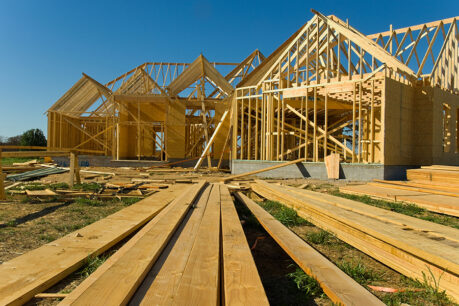
Picture this: You’re house hunting in a market where all that’s available are houses in need of renovation, outdated, and have been crafted in someone else’s vision.
There’s a way to bring your own vision of your dream home to life—by funding your own build with a construction loan.
Let’s review the ins and outs of a construction loan, who is eligible for these loans, and the five stages of a construction loan.
You may have heard that building a home isn’t worth the money, time, and stress. We’re here to show you that it doesn’t have to be difficult with the right lender and the right type of funding.
What is a construction loan?
A construction loan is a home mortgage that bundles together the cost of the land, construction, and the home’s purchase price into one loan.
These loans are efficient and relatively straightforward compared to standard mortgages that require individual loans for each step of the project and purchase.
There are various construction loan products, so it’s essential to speak with a lender who can provide a wide range of different loans to fit your needs and can provide support throughout the five stages of a construction loan.
You may be eligible for little to no down payments depending on the construction loan. This can be possible through VA construction loans and FHA construction loans. However, these loans are only available through lenders approved to provide these loans and qualified individuals.
The Federal Savings Bank is one lending agency that is VA and FHA-approved and offers construction loans, along with conventional, conventional super conforming, and jumbo construction loans.
Construction loans are great products to help homebuyers afford to build their dream homes or in renovating their current homes.
Yes, you can use a construction loan to renovate or update your current home. This can include adding to your property, remodeling your bathrooms, or making the house more accessible.
You can also use a construction loan to purchase a fixer-upper whether you plan to flip it or make it your primary residence.
Who is eligible for a construction loan?
Depending on the type of loan, the lender will determine the requirements for a construction loan.
The typical requirements for a construction loan include:
- Specific credit score range determined by your lender
- Income requirements determined by your lender
- Down payment
- Specific DTI ratio determined by your lender
- PMI (private mortgage insurance)
- Contracts with your builder and any consultants
However, some construction loans, like the VA construction loan, have additional requirements. Because Veterans Affairs fund these loans, you must provide a certificate of eligibility (COE) to show you are a veteran, active-duty service member, reservist, or spouse.
FHA construction loans also have additional requirements, like where you can build your property and how much you can borrow.
If you’re concerned you may not meet the requirements for a construction loan, it would be best to speak with a construction loan specialist.
They can review your financials and background to see which construction loan would be the best product for you.
The 5 stages of a construction loan
A lot can happen before, during, and after construction that can impact your loan.
It’s important to understand what to expect throughout the five stages of a construction loan to prepare yourself for what’s ahead.
This is why it’s also beneficial to work with a lender with experience in providing construction loans so they can help you through every stage of your home-building journey.
It’s important to note, that depending on which construction load product you obtain, the process may vary slightly.
Research & documentation
The first stage of a construction loan is to research local land, builders, and qualified lenders in your area.
You’ll want to find a plot of land and ensure the property aligns with possible requirements.
You’ll also want to gather all personal documentation required to apply, such as your W-2s, proof of income, employment, identification, and building plans and contracts.
Additionally, you should meet with a qualified lender to learn about their construction loan products and if you may be eligible. When you meet with a lender, it would be beneficial to apply for a pre-approval letter.
Pre-approval letters can help you set a budget if one has not yet been determined since it shows how much you’re eligible to borrow. It can also help smooth the approval process and secure a builder as it shows you’re credible and secure to borrow a set amount.
Approval
Once you’ve got all your ducks in a row, you’ll apply for the construction loan. Your lender will review the building plans, projected budget, pre-approval, and financials to determine approval of your loan rates and terms.
This can typically take some time as loan specialists must also review the housing market trends and properties in the surrounding area, as well as other analyses to determine your eligibility.
Construction begins
Once approved, your lender will pay your builder to begin construction. Typically funds are dispersed to your builder at set times throughout the projected schedule of the project.
This can happen at different stages of construction, such as when they complete the roof or walls or install heating components.
During the construction stage, you may have to make monthly payments on your new mortgage. This largely depends on what type of loan product you have, so make sure you ask a construction loan specialist if and when your monthly payments will begin.
Construction ends
Your lender will most likely seek a home inspection to ensure it’s up to code and you must submit any final paperwork to your lender.
If something needs to be added or redone, you must take action before moving forward.
Monthly mortgage payments begin
Once you submit all final paperwork to your lender and your home is approved, your construction loan will convert into your home loan. This is when you begin to make your monthly mortgage payments.
Congratulations—you’ve made it through all five stages of the construction loan and you’ve built your dream home!
The Federal Savings Bank is here to guide you
With any significant financial decision, you should research and engage with specialists who value honesty, transparency, and integrity.
At The Federal Savings Bank, we pride ourselves on doing just that while we serve our clients and our communities.
We believe in building communities beyond walls, meaning that we want to empower families to achieve their homeownership dreams and in turn, empower their own communities.
We understand the excitement, doubts, and questions you’ll experience while building your dream home. We’ll help guide you through all five stages of a construction loan and support you with exemplary expertise.
Call us today at 877-788-3520 to receive a free construction loan quote.
Subject to credit approval. Terms and conditions may apply. Subject to VA eligibility requirements. Property insurance is required on all loans secured by property.
This article is intended for general informational and educational purposes only and should not be construed as financial or tax advice. For more information on financial planning or investment advice, consult a registered investment advisor or financial planner. For tax advice, please consult a tax professional.
This information is intended for educational purposes only. Products and interest rates subject to change without notice. Loan products are subject to credit approval and include terms and conditions, fees and other costs. Terms and conditions may apply. Property insurance is required on all loans secured by property. VA loan products are subject to VA eligibility requirements. Adjustable Rate Mortgage (ARM) interest rates and monthly payment are subject to adjustment. Upon submission of a full application, a mortgage banker will review and provide you with the terms, conditions, disclosures, and additional details on the interest rates that apply to your individual situation.


